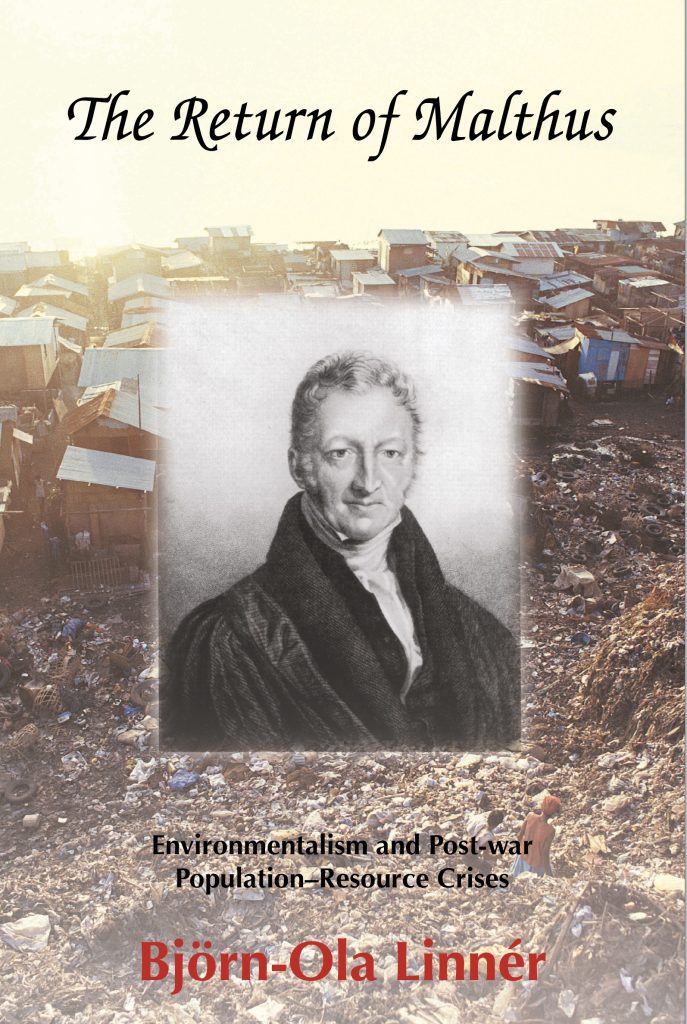The Return of Malthus
Environmentalism and Post-war Population–Resource Crises
Björn-Ola Linnér
‘This pioneering venture fills a genuine gap in the literature on post-war environmentalism … a commendably judicious treatment of a tendentious subject.’
Professor Peter Coates, University of Bristol
‘Nicely blending theory and empirical data, Linnér examines the roots and uses of neo-Malthusianism … The Return of Malthus will appeal to anyone interested in international relations, science, or the environment.’
Professor Kurk Dorsey, University of New Hampshire

The Return of Malthus is the first comprehensive analysis of the post-war fear of scarcity. Linnér traces the development of an international discourse of crisis through the influence of such thinkers as William Vogt, Fairfield Osborn and Georg Börgström, labelled ‘neo-Malthusians’ for their emphasis on an impending clash between population growth and resource limits, after the manner of the nineteenth-century father of scarcity economics. The book analyses the role of science and technology in securing food supply, the transmutation of older ideas about preserving nature into a new conservation ideology based on sustainable use, and the preoccupation of the industrialised nations with forestalling communism and controlling power relations.
First published by The White Horse Press in 2003. Even more relevant today, this revised edition charts perceptions of and prescriptions for crises of population growth and resource shortage, which have had profound influence on agricultural, population and security policies from the Second World War to the present.
Open Access through the support of Linköping University.
‘Before we bury Malthus and all his modern disciples, we need to understand what made them so nervous, for it may be that they saw a few realities that we are in danger of forgetting … Whether right or not, the scarcity prophets were not irrational to question the gospel of progress. They pointed out the heavy costs and risks in our headlong rush to growth. Linnér tells the story of their great doubt, and it is one of the most important stories of the twentieth century.’
Professor Donald Worster, from the Foreword to The Return of Malthus
‘Linnér chronicles the rise and fall of neo-Malthusians with great skill and clarity. His great achievement is to place their ideas within a larger frame, explaining why scarcity economics resonated in a world fraught with the fear of nuclear war.’
Professor Mark Cioc, University of California, Santa Cruz
‘This book is a must-read for anyone wishing to understand the historical context for today’s global debates and all those who worry about the future of the planet.’
Professor Carolyn Merchant, University of California, Berkeley
‘This is an important, novel and detailed account of fears about a global population and resource crisis that emerged after World War II. This crisis was linked to postwar pessimism about human survival in a world of rapidly expanding population, limited resources and possible nuclear conflict with the Soviet Union.’
Horace Herring, Organisation & Environment
‘Within the confusion surrounding the population-scarcity crisis, some perspective and context is necessary. Björn-Ola Linnér provides both in his excellent book’
Michael Egan, H-Environment
THE AUTHOR
Björn-Ola Linnér is a Swedish climate policy scholar and professor at Linköping University. He is program director of Mistra Geopolitics, a research programme that critically examines and explores the interplay between the dynamics of geopolitics, human security, and global environmental change.
TABLE OF CONTENTS
1. Crises of Population and Resources
2. A New World Order
3. Conservation and Containment
4. Neo-Malthusianism in Harvest Time
5. A New Conservation Ideology
6. On the Outskirts of Babel
7. Green Revolutions
8. The Return of Neo-Malthusianism
9. Crisis? What Crisis?
OPEN ACCESS, publication date 1st May 2023
978-1-912186-73-0 – ebook – Open Access
978-1-912186-74-7 – Paperback – £35. 340pp.
